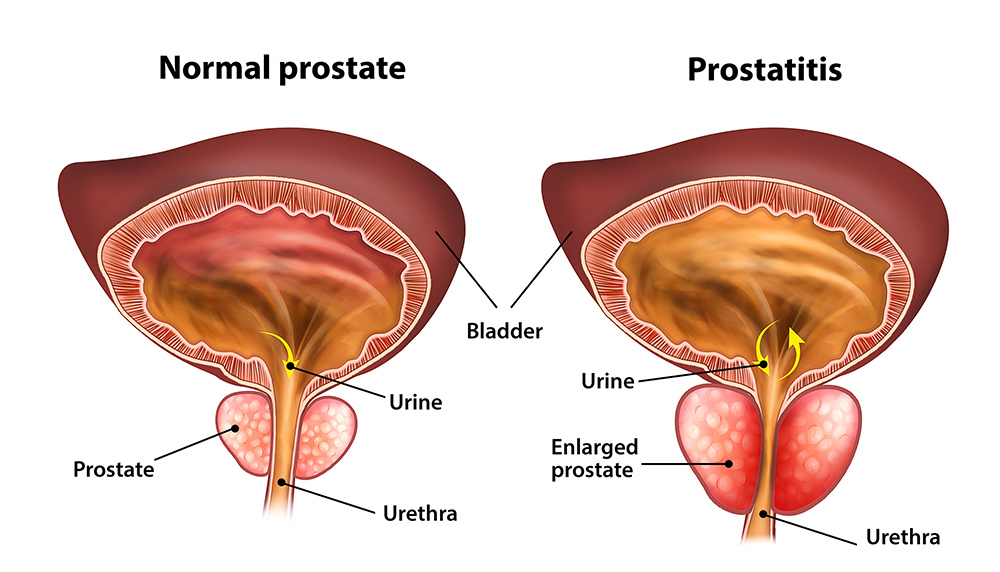- 3 November 2025
- Mr. Leon Almashan
Last updated on November 10, 2025
Many men notice changes in their urinary habits as they grow older. An enlarged prostate, medically known as benign prostatic hyperplasia (BPH), is one of the most common conditions affecting men over the age of 50. At the same time, issues with sexual performance, such as erectile dysfunction (ED), can also become more frequent. This overlap raises an important question: can an enlarged prostate cause erectile dysfunction?
While the two conditions do not always appear together, research shows that there is a clear association between enlarged prostate and erectile dysfunction, with shared risk factors and overlapping physical and psychological effects. Understanding the connection can help men take a proactive approach to both prostate and sexual health.
Table of Contents
ToggleWhat Is an Enlarged Prostate?
The prostate is a small gland located beneath the bladder, surrounding part of the urethra. With age, the gland can increase in size, leading to prostate enlargement or BPH. This is not cancerous, but can cause significant urinary symptoms such as:
- Difficulty starting or maintaining urination
- A weak urine stream
- Frequent urination, especially at night (nocturia)
- A constant feeling of needing to pass urine
Although these symptoms are primarily urinary in nature, their impact on daily life can extend to other areas of health, including sexual wellbeing.

Erectile Dysfunction Explained
Erectile dysfunction is the ongoing difficulty in achieving or maintaining an erection sufficient for sexual activity. It can stem from a wide range of causes:
- Reduced blood flow due to vascular conditions
- Nerve damage or neurological disorders
- Hormonal imbalances
- Stress, anxiety, or psychological concerns
While an enlarged prostate is not a direct cause of ED, there are several ways the two conditions may be linked.
The Connection Between Enlarged Prostate and Erectile Dysfunction
Men with BPH often report problems with both urination and sexual function. The link between prostate health and sexual function can be explained in a few ways:
- Physical symptoms: Constant urinary urgency, discomfort, or interrupted sleep can reduce sexual desire and performance.
- Nerve and blood flow involvement: The close relationship between the prostate, pelvic nerves and blood vessels means that changes in the prostate can influence erections.
- Medication side effects: Drugs used to treat BPH, such as alpha-blockers or 5-alpha-reductase inhibitors, may contribute to erectile difficulties.
- Psychological stress: The frustration of ongoing urinary issues can affect confidence and contribute to performance problems.
Studies show that men with moderate to severe urinary symptoms are more likely to also experience erectile dysfunction, suggesting a strong connection between prostate enlargement and sexual performance.
Shared Risk Factors
Part of the reason why enlarged prostate and erectile dysfunction so often overlap is that they share many of the same risk factors:
- Ageing: Hormonal changes and tissue changes increase the risk of both BPH and ED.
- Cardiovascular health: Conditions like high blood pressure, diabetes and heart disease affect blood flow, impacting both the prostate and erectile function.
- Lifestyle factors: Obesity, smoking, lack of exercise and poor diet are linked to urinary symptoms and ED.

Managing the Impact
For men dealing with both urinary and sexual symptoms, small steps can help reduce the impact on daily life:
- Lifestyle changes: Maintaining a healthy weight, eating a balanced diet and staying active can improve circulation and hormone balance.
- Limiting alcohol and smoking: Both are linked to poorer prostate health and erectile difficulties.
- Medical review: If BPH medication is affecting erections, doctors can discuss alternative treatments or dosage adjustments.
- Managing stress: Reducing anxiety through relaxation techniques or counselling can support overall sexual health.
Although these measures may not fully resolve either condition, they can play an important role in reducing the combined impact of urinary symptoms and erectile issues.
When to Seek Medical Advice
Experiencing both urinary changes and erectile difficulties can feel overwhelming, but it is important not to ignore the symptoms. Consulting a healthcare professional allows for a proper investigation into the underlying cause.
Not all erectile dysfunction is linked to prostate enlargement, and not all prostate symptoms will lead to ED. A tailored assessment helps identify whether the issue is due to benign prostatic hyperplasia, lifestyle factors, or another medical condition.
At MansMatters, the focus is on providing men with clarity and support in addressing the full spectrum of intimate health concerns, including prostate-related erectile dysfunction.
Conclusion
So, can an enlarged prostate cause erectile dysfunction? While BPH does not directly cause ED, the two conditions are closely related. Urinary symptoms, medication side-effects and shared risk factors all contribute to a higher likelihood of erectile difficulties in men with prostate enlargement.
Recognising this connection is the first step towards improving both prostate and sexual health. With the right information and medical guidance, men can take control of their wellbeing and reduce the impact of these common conditions.
FAQs
What is the link between an enlarged prostate and erectile dysfunction?
An enlarged prostate can cause urinary symptoms that affect sexual performance. Research also shows shared risk factors and medication side effects contribute to erectile problems.
How does an enlarged prostate affect sexual function?
Urinary urgency, frequent nighttime trips to the bathroom and pelvic discomfort can disrupt intimacy. In addition, changes in blood flow and nerve function may influence erections.
Can prostate problems lead to erectile dysfunction in men?
Yes, prostate conditions such as benign prostatic hyperplasia (BPH) are often linked with erectile dysfunction. This relationship is partly physical and partly psychological.
Does benign prostatic hyperplasia cause erectile problems?
BPH itself does not directly cause erectile dysfunction, but it is closely associated with it. Both the urinary symptoms and some BPH medications can play a role.
Is erectile dysfunction always a symptom of an enlarged prostate?
No, erectile dysfunction has many causes, including cardiovascular disease, hormonal imbalances and psychological factors. While an enlarged prostate may contribute, it is not always the underlying reason.
Are medications for an enlarged prostate linked to ED?
Some treatments, such as alpha-blockers and 5-alpha-reductase inhibitors, may affect erections. If side effects occur, reviewing treatment options with a doctor is recommended.
What risk factors are common to both prostate problems and erectile dysfunction?
Ageing, high blood pressure, obesity and diabetes are shared risk factors. Addressing these can improve both urinary and sexual health.
When should men seek help for prostate and erectile concerns?
If urinary changes are accompanied by erectile difficulties, a medical assessment is important. Early advice helps identify the cause and guide treatment options.

About the Author
Mr. Leon Almashan
Mr. Almashan is a recognised specialist in advanced, non-surgical treatments for men’s health conditions, including Erectile Dysfunction and Peyronie’s Disease.
A graduate of St. George’s Medical School, he has developed innovative treatment protocols that have supported improved quality of life for 1000’s of patients worldwide.
Categories
Categories
- Erectile Dysfunction (14)
- Lifestyle (9)
- Mental Health (3)
- Other (3)
- Peyronie's Disease (5)
- Premature Ejaculation (2)
- Related medical conditions (3)







